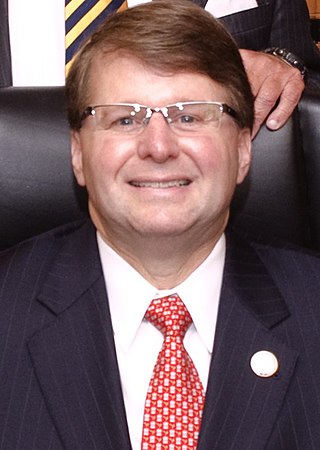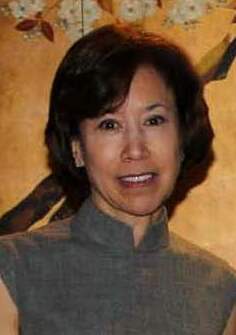Related Research Articles
Elizabeth City State University (ECSU) is a public historically black university in Elizabeth City, North Carolina. It enrolls nearly 2,500 students in 28 undergraduate programs and 4 graduate programs and is a member-school of the Thurgood Marshall College Fund and the University of North Carolina system.

Sarah Parker is an American judge who served as the chief justice of the North Carolina Supreme Court from February 2006 until August 2014.

Mark D. Martin is an American jurist who served as the chief justice of the Supreme Court of North Carolina from 2014 through 2019. He was appointed by North Carolina Governor Pat McCrory to become Chief Justice on September 1, 2014 upon the retirement of Sarah Parker. Martin was already running for the seat in the 2014 general election.

The North Carolina Court of Appeals is the only intermediate appellate court in the state of North Carolina. It is composed of fifteen members who sit in rotating panels of three. The Court of Appeals was created by the North Carolina General Assembly in 1967 after voters approved a constitutional amendment in 1965 which "authorized the creation of an intermediate court of appeals to relieve pressure on the North Carolina Supreme Court."
John Charles Martin is an American attorney, who retired as a Judge of the North Carolina Court of Appeals on August 1, 2014.
John Marsh Tyson is an American jurist and government official who currently serves as a judge of the North Carolina Court of Appeals. He also previously served on the court from 2001 to 2009.
Paul Martin Newby is an American judge, who was first elected to a seat on the North Carolina Supreme Court in 2004. He was elected Chief Justice in 2020.

Allyson Kay Duncan is a former United States circuit judge of the United States Court of Appeals for the Fourth Circuit. She was the Fourth Circuit's first female African American judge.
Robinson O. Everett was an American lawyer, judge and a professor of law at Duke University.

Loyola University New Orleans College of Law is a private law school in New Orleans, Louisiana affiliated with Loyola University New Orleans. Loyola's law school opened in 1914 and is now located on the Broadway Campus of the university in the historic Audubon Park District of the city. The College of Law is one of fourteen Jesuit law schools in the United States. It is also one of the few law schools in the nation to offer curricula in both Civil Law and Common Law. The school releases several academic journals, most notable of which is the Loyola Law Review.
Kristin H. Ruth is a former state district court judge in North Carolina, who served District 10.

James Columcille Dever III is an American attorney and jurist serving as a United States district judge of the United States District Court for the Eastern District of North Carolina.
Richard Cannon Erwin was a United States district judge of the United States District Court for the Middle District of North Carolina and politician who was the first African American to be elected to statewide office in North Carolina.

Albert Diaz is a United States circuit judge of the United States Court of Appeals for the Fourth Circuit. Diaz is the first Hispanic judge to serve on the Fourth Circuit. Prior to his appointment to the Court of Appeals, Diaz was a North Carolina state superior court judge and an appellate judge for the Navy-Marine Corps Court of Criminal Appeals.
S. Gerald Arnold is a North Carolina lawyer and jurist who served as a judge of the North Carolina Court of Appeals, including service as that court's Chief Judge (1992–1998).

Joseph Robert John Sr. is a member of the North Carolina House of Representatives, having served since 2017. He is a former judge of the North Carolina Court of Appeals. He served on that court from 1992 until 2000. Previously, he had been a state superior court and state district court judge, based in Greensboro. He had also been a prosecutor and practiced at the firm of Pell, Pell, Weston & John.

Duke University School of Law is the law school of Duke University, a private research university in Durham, North Carolina. One of Duke's 10 schools and colleges, the School of Law is a constituent academic unit that began in 1868 as the Trinity College School of Law. In 1924, following the renaming of Trinity College to Duke University, the school was renamed Duke University School of Law.

Robert Christopher "Chris" Dillon is a North Carolina attorney and judge of the North Carolina Court of Appeals. Dillon won election to the appellate court in a statewide race on Nov. 6, 2012, when he defeated incumbent Cressie Thigpen. Dillon won re-election on Nov. 3, 2020 over challenger Gray Styers.
The North Carolina Bar Association (NCBA) is the voluntary (non-mandatory) bar association of the U.S. state of North Carolina. NCBA membership is voluntary and tax money is not involved in its support. In contrast, the North Carolina State Bar and the North Carolina Board of Law Examiners are state agencies.

One justice of the seven-member North Carolina Supreme Court and five judges of the 15-member North Carolina Court of Appeals were elected by North Carolina voters on November 8, 2016, concurrently with other state elections. Terms for seats on each court are eight years.
References
- ↑ News & Observer: Becton to represent state's lawyers ("In 2003, Judge Allyson K. Duncan of the Fourth U.S. Circuit Court of Appeals became the first black woman to head the group")
- ↑ WRAL: NCCU chancellor to retire
- ↑ WAVY: Interim chancellor named
- ↑ UNC System press release
- ↑ Quiet revolution in the South By Chandler Davidson, Bernard Grofman